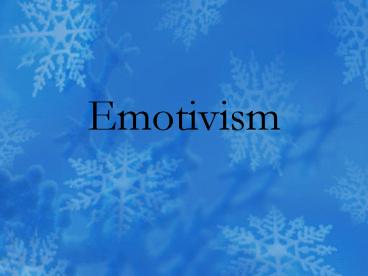Emotivism PowerPoint PPT Presentation
1 / 15
Title: Emotivism
1
Emotivism
2
Background
- Naturalists say that moral behaviour can be
examined in the same way as other features of the
universe scientifically - Intuitionists believe we have an ability within
us that is able to make a judgement based on what
we perceive. - Some reject these ideas entirely!
3
David Hume (1711-1776)
- Sentiment or feeling (emotion) is the source of
right and wrong. - If you decide to help someone in need you do so
because you have feelings, not reason. Compassion
has nothing to do with reason. - You cant go from a factual statement (an is)
to a moral one (an ought)
4
- I ought to do something to help
- This is a starving child
5
- Moral facts are not like scientific facts
- they are not facts at all
6
AJ Ayer (1910-1989)Language, Truth and Logic
(1936)
- When we make moral statements we are not talking
about objective facts that can be known but are
expressing our emotions or feelings - Statements are only true or false as far as we
agree or disagree with them
7
Stealing is wrong
- means
I disapprove of stealing
8
Sometimes this is called the Boo-Hurrah theory
- Boo to stealing
- Hurrah to respect for other peoples property
These are non-propositional statements as they
do not make any factual statement about an
objective, knowable reality
9
Benefit of emotivism?
- Emotivism draws attention to the way that moral
statements depend on our own attitudes, feelings
and upbringing
10
Criticisms
- Emotivism does not seem to have much substance
our use of ethical language could change from one
day to the next according to our feelings
11
One opinion becomes no more important then
another
Mars bars are better than Twix
The murder of the Jews during the Holocaust was
evil
Goths are gorgeous
12
- Many would say that moral statements are much
more than just expressions of preference. - We do not want a judge to merely express a
personal preference when making a decision about
a difficult case, such as whether to separate
Siamese twins or allow a life-support machine to
be switched off.
13
CL StevensonEthics and Language
- Developed Ayers ideas
- Agreed with Ayer that ethical statements are
expressions of opinion - BUT also argued that these personal opinions are
not arbitrary they are based on beliefs about
the world and how we think it should be - We disapprove of Holocaust murders because we
have beliefs about human worth, not just because
this is a personal preference
14
RM HareThe Language of Morals
- Goes further than Ayer
- When we make moral statements it is because we
want others to share this view - Moral statements have a guiding role too
- We become heated during arguments because we ant
others to share our views
15
Do not run in corridors, boy
A suggestion, or a command?

